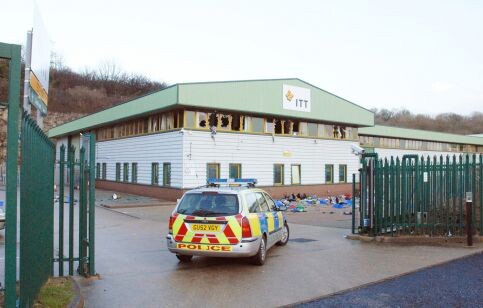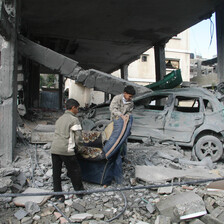The Electronic Intifada 7 July 2010

The EDO/ITT arms manufacturer in Brighton after it was decommissioned by activists in the UK. (Smash EDO)
Seven anti-war activists on trial for entering a Brighton weapons factory and “decommissioning” it were found unanimously “not guilty” last week.
On 16 January 2009, in the midst of Israel’s relentless bombing of Gaza, six of the defendants broke into the premises of EDO MBM, a supplier of weapons components. According to one of the defendants, Elijah Smith, they “set out to smash it up to the best of our abilities.” Two activists who supported them outside the factory gates were also put on trial for “conspiracy to cause criminal damage”
It was an entirely accountable action which was always intended to end in a trial and each decommissioner had pre-recorded a video in which they stated the reasons for their participation — to help dismantle the war machine from the factory floor.
Once inside the building, the six barricaded themselves in and set to work; equipment used to make weapon components was trashed and computers, filing cabinets and office furnishings were thrown out of the windows. Once they were done they calmly waited for the police to arrest them. All of the defendants have argued that what they did was not only morally necessary but crucially, that it was legal. UK law allows the commission of damage of property to prevent greater crimes.
Two of the accused, Simon Levin and Chris Osmond, have extensive experience of working in Palestine with the International Solidarity Movement. Chris Osmond told the court that “the humanitarian disaster unfolding in Gaza at that time meant it was imperative to act.” He cited the words of Rachel Corrie, the US activist who was killed in 2003 by an Israeli soldier operating a bulldozer in Gaza, as an inspiration. The court heard a passage of Corrie’s diary in which she wrote: “I’m witnessing this chronic insidious genocide and I’m really scared. This has to stop; I think it is a good idea idea for all of us to drop everything and devote our lives to making this stop.”
During the trial the court heard not only from the defendants themselves but from Sharyn Lock, a human rights volunteer who was in Gaza during the winter 2008-09 attacks. She was inside al-Quds hospital in Gaza City when it was attacked with white phosphorus. She concluded her evidence by saying that she had no doubt that those who armed the Israeli Air Force “had the blood of children on their hands.” The jury saw footage of the air attacks on the UN agency for Palestine refugees (UNRWA) compound where civilians were sheltering and have been given an edited version of the Goldstone report.
Recently-elected member of parliament for the local area, Caroline Lucas also gave evidence supporting the activists, saying that the democratic process “had been exhausted” as far as the factory was concerned.
On 17 January 2009 the bombs had already fallen relentlessly on Gaza for three weeks. Massive, passionate demonstrations and pickets had been held in many cities around the country and the world in protest against Israel’s war crimes, but to no avail. A growing sense of helplessness was grabbing hold of the movement as the Palestinian body count stood at more than 1,400 and counting. Three hundred of the dead were children. It was in this context that the “citizens’ decommissioning” of EDO MBM/ITT took place.
The arms manufacturer EDO/ITT has been based in Brighton since 1946. Acquired along with the rest of EDO Corporation by the multinational arms conglomerate ITT in December 2007, the company’s primary business is the manufacture of weapons systems such as bomb release mechanisms and bomb racks. Crucially, this includes the manufacture of the VER-2 Zero Retention Force Arming Unit for the Israeli Air Force’s F16 war planes.
Over the years EDO has consistently denied supplying Israel, and despite more than fifty court cases campaigners have not been able to properly expose the links between the factory and the IAF. However the serious nature of the charges against the eight activists (the factory sustained nearly £200,000 — or $301,600 — of damage and may not have recommenced production for weeks) means that for the first time courts are taking seriously the argument that EDO’s business is fundamentally illegal.
Paul Hills, the managing director of EDO MBM, spent his five days on the witness stand at the beginning of the trial being confronted with all the evidence gathered by campaigners over the years exposing a complex network of collaboration between British, American and Israeli arms companies and the way in which their deals are clouded in secrecy. The activists on trial were able to present Hills, for the first time, with a dossier of evidence showing how EDO MBM uses a front company in the US to indirectly supply components for F-16 aircraft to Israel. Under UK law the supply of weapons components that might be used in the occupied West Bank and Gaza Strip is actually a crime.
After hearing Hills’ explanations of his company’s business practices, Judge George Bathurst-Norman said that despite Hill’s denials of dealing with Israel, it was clear that there was enough evidence to justify a genuinely-held belief that they did. He also offered the opinion that End User Certificates required for arms export licenses were “not worth the paper they are written on” as they can be easily manipulated.
There is a history of juries in British courts finding anti-war activists not guilty when they attack machinery used in war crimes. In 1996 four women from Trident Ploughshares decommissioned a Hawk jet that was about to be shipped to Indonesia — they were found not guilty. In 2008 the Raytheon 9, who damaged a factory in Derry supplying weapons to Israel during the 2006 Lebanon war, were acquitted by a jury and only two weeks ago a group of nine women carrying out a similar action at Raytheon during the Gaza attacks were also found not guilty by an unanimous jury.
The not guilty verdicts handed down by a jury of randomly selected members of the public, will make it clear to companies like EDO that not only is there a growing number of people who are willing to risk their own liberty to stand up for the people of Gaza and to challenge Israel’s war crimes through whatever means possible, but that public opinion in the UK is hardening against Israel.
Chloe Marsh is a long-term peace campaigner and activist. She has been involved in campaigning against the arms trade for many years and opposing the illegal wars in Iraq and Afghanistan, and she’s also worked with the International Solidarity Movement in Palestine. Smash EDO has been campaigning for the closure of EDO MBM/ITT for six years. To get involved, visit: www.smashedo.org.uk

